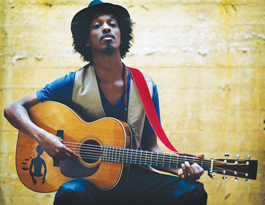home | metro santa cruz index | music & nightlife | band review

Lost Boy: K'naan keeps it real on his second release, 'Troubadour.'
The World Is A Ghetto
Somali-born rapper K'naan makes the first great album of the year.
By Gabe Meline
K'naan is a humble, gifted 21-year-old artist who grew up in war-torn Somalia and learned English by listening to American hip-hop CDs. His family eventually raised enough money to move to the United States, and shortly after his arrival, armed with an innate knack for poetry and a Third World backstory, K'naan released his hip-hop autobiography, The Dusty Foot Philosopher, an album as expansive and astonishing as it is smart and honest. He attracted the attention of Mos Def and Damian Marley and the adulation of a handful of critics, but due to small distribution, it sadly eluded the public at large.
Troubadour, K'naan's major-label follow-up released late last month, is challenged from the outset with needing to achieve two goals: one, to keep up the intellect and honesty of Dusty Foot, and two, to appeal to the masses. Though it contains a few transparently contrived attempts at sales appeal (a track featuring Adam Levine from Maroon 5 should be deleted immediately from iTunes playlists), Troubadour succeeds largely because of K'naan's talent, which isn't made the lesser for overproduction.
M.I.A.'s surprise hit "Paper Planes" might have stolen international music from the baby boomers, but K'naan all but locks it up for the young generation. Album opener "T.I.A." rattles with the same vigor and triplets of Kala with the crusade of taking groupie-laden rappers on a field trip through true African ghettos; "Dreamer" interpolates quotes from A Tribe Called Quest, N.W.A. and the Pharcyde while fantasizing of leaving "the only place worse than Kandahar." A Hustle and Flow-quoting Mos Def and Chali 2na both show up on "America," the best verses of which belong to K'naan rapping in Somali, and closer "People Like Me" soberly links Iraq to the guns and grenades of K'naan's youth spent in the Somali civil war.
All told, the album makes one of the most convincing cases for a new globalized music. There's a wide variety of styles on Troubadour--from chopped funk breaks to dancehall blasts, from goombay choruses to "My Boyfriend's Back" melodies and Procol Harum chord progressions--and on top of it all, pushing the album into greatness, is K'naan's heart. "Is it true when they say all you need is just love?" he asks on the empathetic "Fatima." "What about those who have loved, only to find that it's taken away? And why do they say that the children have rights to be free?"
Send a letter to the editor about this story.
|
|
|
|
|
|